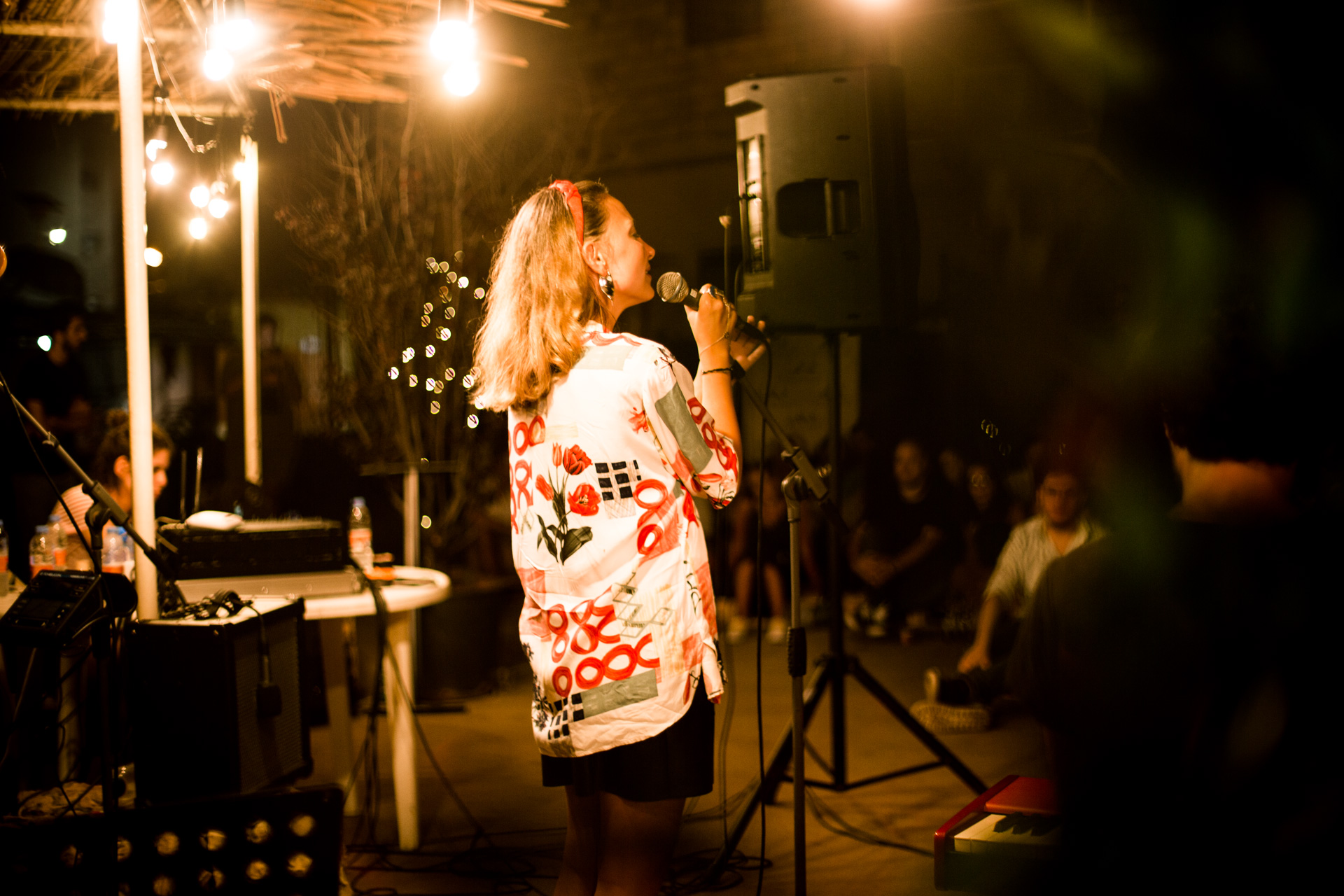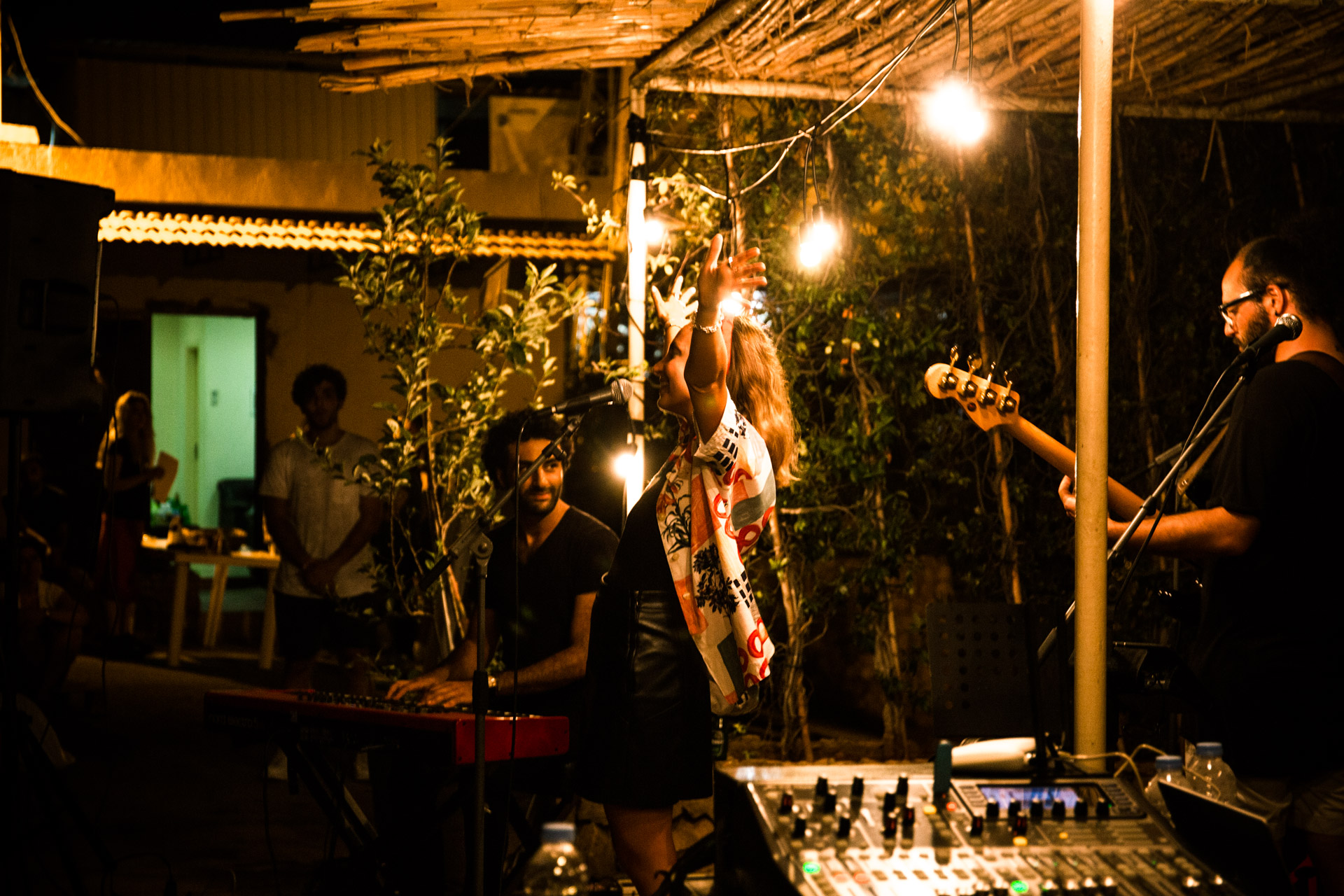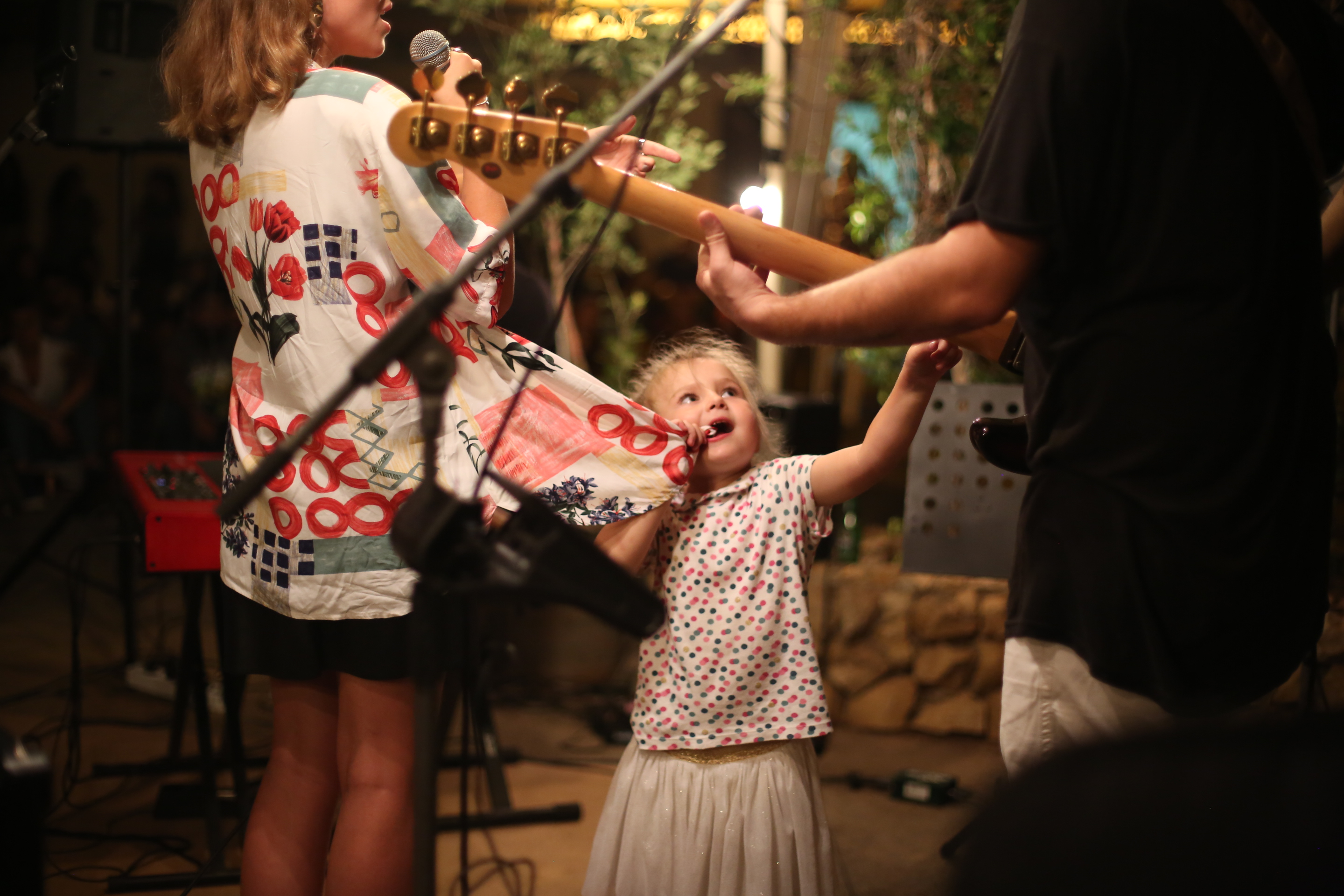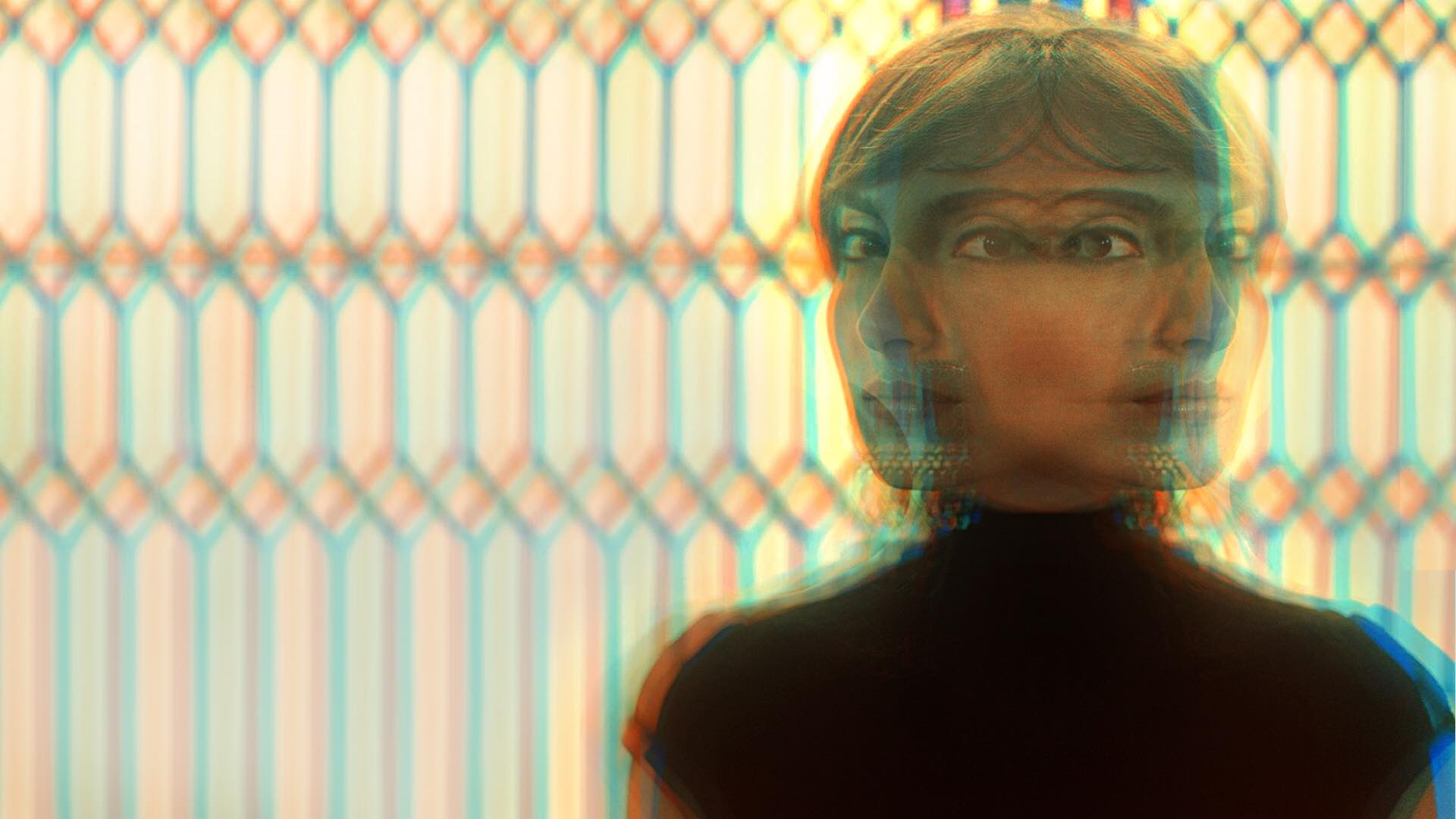After her striking performance at Global Week for Syria (in Beirut) the night before, it took me ten minutes of waiting in the sun-lit streets of Gemmayzeh to wake Lynn up. She invites me to the naturally-lit balcony of an Airbnb she had booked on the occasion of this performance. In between the sharp noises of early truck drivers making their daily deliveries and the sporadic interruptions of her daughter Sarah who seemed oblivious of the fact that her mom is being interviewed but keen on finding some morning entertainment, we managed to have a conversation about her musical journey of longing and belonging.
— Interviewed by Majd Shidiac

You discovered your passion for music singing for the Choir of Joy at the Church of Lady Damascus. What were the turning points in that experience?
I think the whole experience at the choir was the reason why I wanted to make music or wanted to be on stage; it became a habit. I used to take solo parts ever since I was a child and it was very scary for me to be on stage, but I got used to it. I just cut this fear and got used to it—almost craved it at times. I don’t feel like there was one specific moment during which I realized I wanted to do music; it just came naturally to me, something I grew up with. With time, it became a spiritual practice of some sort “riyada rou7iyyeh”—like yoga. I felt like I needed it. At that time, I didn’t know that, but connecting with a crowd is something I love so much. To be able to speak to a crowd and send a message is such a privilege. I’m not necessarily a full-time singer, I make music because I want to.
…How different is it for you to sing at the alter as opposed to the stages you perform on today?
I kind of make the relation between both. Music is very spiritual for me, it’s like a constant prayer. Even when I do quick jazz standards, I still feel like it’s a form of connecting with the bigger picture. Sometimes I have difficulty praying but when I sing, I really feel like I’m communicating with this greater being. It’s very much related, and maybe that’s why I sing this one prayer in all my concerts. (Music) has become my sanctuary. The content is not the same of course, but it’s still the same spiritual state for me.
…What are the moments you look for in either?
At church, you’re praying and communicating through actual prayers but on stage, you get direct feedback from the crowd. You see the faces and the reactions, and that’s very precious to me.

Your music is a mix of traditional Oriental sounds and Jazz improvisation with a sort of longing piousness. Is that a result of your personal journey or your musical one?
I think it’s a mix of both, really! It definitely started with a personal journey; I was at a difficult part of my life when I wanted to do the album, and it felt like something stronger than me was pushing me to record it. I actually remember this one night, I’ll never forget it, I woke up at 3:00 am—which usually doesn’t happen because I’m a real deep sleeper—but I woke up in France and really felt that I had to write down the repertoire; I just had to. I wrote the list, maybe added one or two songs later, but it was a burning need—it felt like it was a birth. I couldn’t wait anymore, I learned not to wait before doing what I have in mind. The album helped me understand the importance of that. My debut album feels like an important achievement, it’s the first time I feel like I’ve done something complete.
It’s also a musical experience. Since (the album) it was my opening to the world, I had to tell the world what I do, and what I like. That’s why there is a prayer, that’s why there are two jazz standards in which one of them is in Arabic, and my own music. There’s also a Bulgarian song (Barada) in the middle because I was very into Bulgarian music. *She hums the song effortlessly*
I really tried to mix it up; I was worried it would appear a bit schizophrenic but I tried to tie everything together neatly.
Speaking of your musical journey, you moved to Paris to enroll in the American School of Modern Music and then pursued vocal Jazz. What was it about leaving home that gave you clarity?
For me, leaving home was the key to do what I wanted to do. It’s about leaving Damascus itself and about leaving my comfort zone as well. I left before the Syrian uprising; it was a time where Syria was very much open to the world musically, and if I wanted to do something it would’ve been possible. But I felt that I had to see what’s out there, especially in the West. I had a curiosity to see what the West had to offer that we didn’t have, and I had a mentality of someone who lives outside of the Arab world from a young age—maybe because we immigrated to Canada when I was young. I was really curious, and I needed my independence in life, imagining myself living outside of my family’s home. Music in the Arab world was a pretty difficult option. Even if you wanted to pursue music as a hobby or semi-professionally, it’s still complicated. If you want to do your own music, you won’t have a lot of listeners. There’s a certain type of music (usually more entertaining) that would attract listeners, but I was interested in more intellectual music. That’s why I had to go and see. I finished my studies in pharmacy and wanted to study music and the options at the Syrian conservatory were limited to either Opera or Sharqi singing—yet I wasn’t interested in either. So I joined the American school of modern music then applied to the CRR. It was very difficult to get in so I also felt like it was a challenge I had to overcome.
… how did that embody itself in the process of producing your debut album Youmma?
Youmma is a mix of everything; it’s my journey. The journey starts when you’re born, how you grew up, what you listened to as a child, your school, your first lover, your first kiss, leaving home, my husband and my daughter. It’s a mix of all that. It’s difficult to say it all in one album, and that’s why I feel it’s an extension of various aspects of my life. It will always be a mix of my past and my present.
To be honest, if I had to pick a moment when I realized how important music is to me, it would be my experience with my husband.
My husband was sick for three years and he passed away two years ago—I felt like life is fragile and we don’t really have a lot of time. It’s a very thin line between normal life and catastrophe, between health and disease. When you see someone so full of life, and life was being taken away from them gradually, it really changes you forever. You assist in losing life and deal with it. How he dealt with it, how he knew it was coming and how I was in denial. He is such a book to be written, and writing that book is one of my dreams. The things he wrote and talked about is something so precious for all of us, I feel.
The first recording I posted on Facebook was at a very hard time for us. I felt there was a darkness inside of me that I had to transform into something positive, a source of strength, and music was my platform. I’m a good musician, but there are geniuses and that usually stopped me from doing things because I’m a perfectionist. But I learned that it’s not about how good you are, it’s more of how human you are. It’s really about being true, helping others through art—it’s human. I had to do this to be able to be proud of myself and not regret not doing it.

Did you mean to tell this story through your album, or did it just reveal itself on its own?
I didn’t necessarily want to talk about the experience, but it came naturally—it was in the essence of why I needed to do the album.
The first song I wrote, “Room310” was a song I wrote when my husband first got sick—we didn’t necessarily know what it was, but I was in shock when I wrote the song. A bit later after Sarah was born, I wrote “Shona” and I wrote “Youmma” at the Beirut airport after he passed away. The story forced itself into the album because it was in my head all the time. I didn’t want to tell the story of loss because I didn’t want people asking questions—even now, talking about it with you is a bit awkward—I wanted to keep it very intimate. It’s a sacred side of me and I wanted to respect his privacy, but I had to get it out of my system. The whole experience was very much a secret, we kept it like that until a late phase but with the album, I decided to do the opposite because I felt like people can connect to my story.
You’ve mentioned before that your music is meant to speak to all kinds of cultures and backgrounds, and you’ve mastered scat singing and adapted it to Oriental sounds. What is the most challenging in mixing these cultures, techniques, and scales?
I think my biggest challenge is not repeating myself. I never want to do things that are similar, I always want to challenge my boundaries. Another challenge is that scats make me write fewer lyrics, and sometimes I feel like I want to say things, but they help me visualize the music in my head. I only want to sing in Arabic, it’s me, and that’s very difficult because it stops me from connecting to a wider audience. But mixing Arabic with Jazz standards creates a bridge between my culture and others, and that’s the message I intend to send. I do Jazz standards with Arabic lyrics for that, and if one day I start a solo project in Arabic, it’d be because I want to communicate with people with the language and melodies that represent who I am and where I come from. Even now, people still have a jaded perception of us (Arabs), and I feel like I have a chance to clarify that.

Who are some artists that you consider musical influences?
I listen to very different genres at once, I just need to have a dose of everything. Aziza Mustafa Zadeh, an Azerbaijani jazz musician is one of my main influences. She’s really incredible in her Azerbaijan-inspired jazz. Tigran Hamasyan, a fantastic Armenian jazz pianist. I guess Aziza is my vocal influence while Tigran could be my musical one. Charlie Parker, definitely (Bebop in general), John Coltrane—I mean everyone who’s interested in Jazz has to have John on their playlist. Ella Fitzgerald—pretty typical I guess, but she was a simple smooth introduction to jazz for me—it was a great place to start learning about jazz through her. I love ‘Arab’ music, and I love Missy Elliott too. I could really listen to anything, as long as I connect with the music.
One of your tracks (“Titi”) was written as a lullaby for your daughter Sarah, and when you performed it live at Sofarsounds Beirut, she ran to you and joined you on stage in a heart-capturing moment. How do you feel being a mother has affected your musical journey?
It’s not easy to be creative and musical while being a full-time mother. It’s a huge challenge to follow your art and take care of your child at the same time. But it teaches you how to be generous in everything you do. It teaches you how to love and be patient. Having a child makes you feel like you can handle anything, like you’re powerful enough to deal with whatever is thrown at you. It’s a force of its own.

